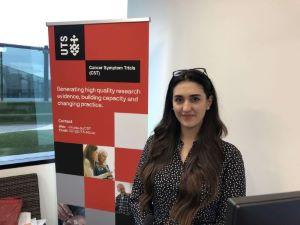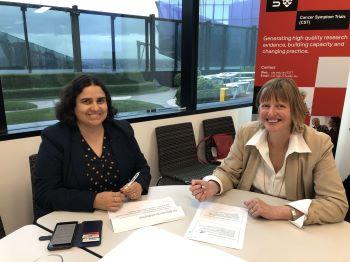Cancer Symptom Trials (CST) and the Victorian Comprehensive Cancer Centre (VCCC) co-hosted a concept development workshop on immunotherapy on 12 June at the VCCC in Melbourne.
Immunotherapy represents a paradigm shift in oncology, greatly impacting quality of life and control of symptoms for people with cancer.
Professor Meera Agar, CST Chair, said, 'CST was delighted to collaborate with the Palliative Care Clinical Trials Group at VCCC and the Cancer Research Economics Support Team to conduct a workshop to set an agenda for trials research to improve outcomes for people experiencing symptoms related to immunotherapy.
As the field of immuno-oncology accelerates, research to ensure that symptoms don't impede tolerance to treatment or impair quality of life is critical to ensure breakthroughs can achieve their true potential for better cancer outcomes.'
Professor Grant McArthur presented on the place of immunotherapy now and into the future. He outlined the current landscape and priorities for immunotherapy research including ways to combine immunotherapy with other cancer treatments, potential for personalised immunotherapies and effective immunotherapies for specific cancers.

Melanie Mora
Melanie Mora shared her findings from her literature review on symptomatic support for people with immunotherapy adverse effects and the cancer immunity cycle, focusing on the role of immune checkpoint inhibitors and associated adverse effects.
A presentation on the complexities surrounding the health economic argument for immunotherapies was given by Dr Richard De Abreu Lourenco. Given the high cost of immunotherapies, there is scope to assess the impact of a durable response and survival resulting from immunotherapy, the potential for reduced treatment costs in the future, the value of 'hope' and innovation, the potential for improved productivity, and the impact of better quality of life for both patients and their carers.
Following three engaging presentations, Professor Meera Agar and Professor Jennifer Philip led a collaborative discussion to produce several study design ideas.
Professor Jennifer Philip said, 'Clinicians, consumers and researchers from multiple disciplines were really engaged in sharing ideas around understanding and managing the symptoms associated with cancer immunotherapy.'

Professor Meera Agar and Professor Jennifer Philip
Communicating well with patients was a high priority discussion topic for delegates. They highlighted the importance of managing patient and carer expectations about the potential outcomes of immunotherapy treatments. More research is required to predict who will most benefit from immunotherapy and delegates discussed the need to gather more patient reported outcome measures to truly understand the patient experience and better manage expectations.
Initial ideas to further immunotherapy research focused on mapping adverse effects of current therapies, understanding patient experience, and education on patient communication.
CST and VCCC extend their thanks to the three presenters.
Professor Grant McArthur is Head of the Molecular Oncology Laboratory, Lorenzo Galli Chair in Melanoma and Skin Cancers at the University of Melbourne, Fellow of the Australian Academic of Health & Medical Science (AAHMS) and Executive Director for the Victorian Comprehensive Cancer Centre.
Melanie Mora is a Research Assistant-Writer for Cancer Symptom Trials, working with clinical trial researchers to develop clinical trial protocols, generate literature reviews, and prepare grant applications and ethics submissions.
Dr Richard De Abreu Lourenco is Senior Evaluator PBAC Evaluation Services, Centre for Health Economics Research and Evaluation, and Co-lead of the Cancer Australia National Technical Service, the Cancer Research Economics Support Team.

